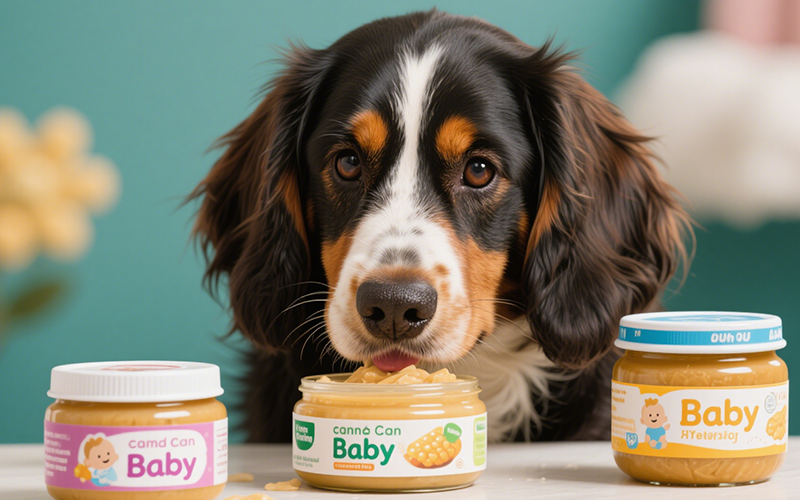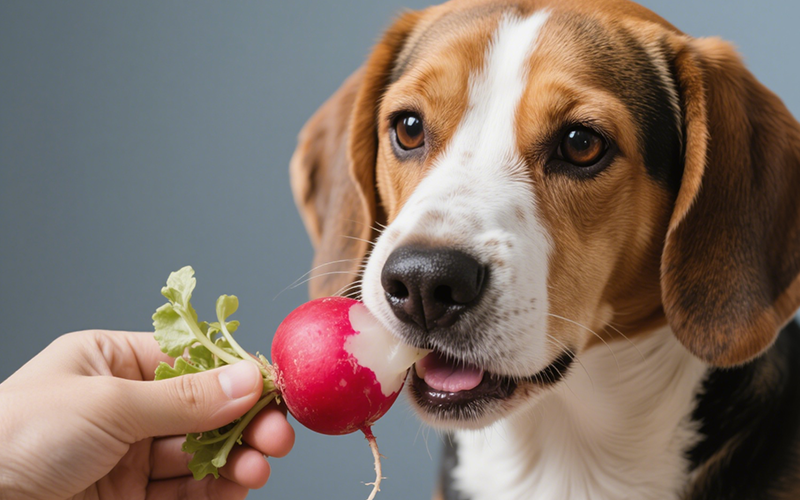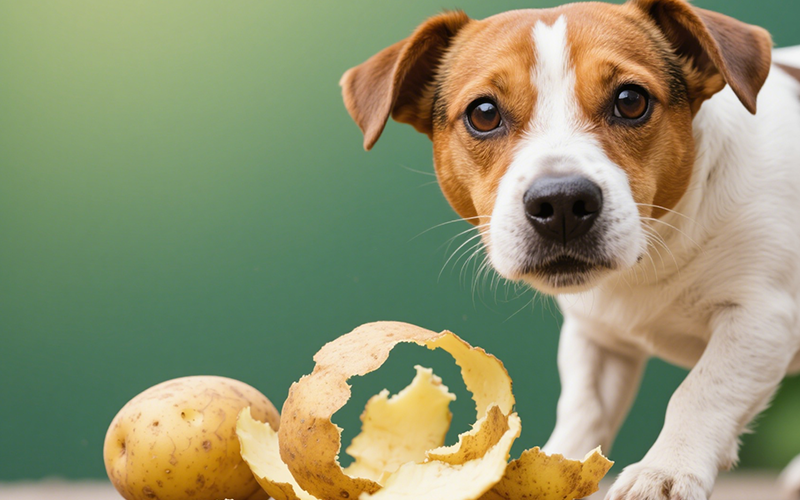Can Dogs Eat Baby Food? Vet Insights on Safety, Benefits & Risks
- 11 Apr 2025 16:32
As loving pet parents, we're always looking for ways to pamper our dogs or help them through times of illness or picky eating. Baby food, with its smooth texture and seemingly simple ingredients, often comes to mind as a potential treat or meal supplement. It seems gentle, palatable, and convenient. But the crucial question remains: can dogs eat baby food safely? While the answer is often yes for certain types, it comes with significant caveats. Not all baby foods are created equal, and some contain ingredients that are extremely dangerous for dogs.
This comprehensive guide delves into the world of baby food for dogs, exploring the potential benefits, the critical risks, which types are safe, which to avoid at all costs, and how to offer it responsibly. We aim to provide authoritative and trustworthy information, adhering to E-E-A-T principles, to help you make the best decisions for your furry friend's health and well-being.

What Exactly is Baby Food?
Baby food typically refers to commercially prepared purees made from single or multiple ingredients, designed for infants and young children who are transitioning to solid foods. It's characterized by its smooth, soft consistency, making it easy to swallow and digest for those without mature chewing abilities or digestive systems.
Common categories include:
Fruit Purees: Applesauce, bananas, pears, peaches, berries.
Vegetable Purees: Carrots, sweet potatoes, pumpkin, green beans, peas, squash.
Meat Purees: Chicken, turkey, beef, lamb, often mixed with water or broth.
Combination Meals: Mixtures of meats, vegetables, and sometimes grains.
Cereal Paps: Rice or oatmeal cereals, often fortified.
The simplicity associated with "Stage 1" baby foods (single ingredient purees) is often what makes pet owners consider them for their dogs.
The Appeal: Why Consider Baby Food for Dogs?
Several factors make baby food seem like an attractive option for canines:
Palatability: Many dogs find the simple flavors and smooth textures highly appealing, especially meat-based options.
Soft Texture: Ideal for dogs with dental problems, mouth pain, senior dogs who struggle to chew, or those recovering from oral surgery.
Digestibility: The pureed form can be easier on the digestive system for some dogs, particularly those experiencing certain gastrointestinal issues (though this depends heavily on ingredients).
Convenience: Ready-to-serve jars or pouches are easy to store and dispense.
Appetite Stimulation: Can sometimes entice sick, recovering, or very picky dogs to eat when they refuse their regular food.
Administering Medication: The soft texture can be useful for hiding pills.
While these reasons seem valid, they must be weighed against the potential dangers hidden within some baby food formulations.
Is Baby Food Generally Safe for Dogs? The Crucial Nuances
The safety of baby food for dogs hinges entirely on its ingredients. Plain, single-ingredient purees of dog-safe fruits, vegetables, or meats (like plain chicken or pumpkin) are generally considered safe when given in strict moderation as a treat or temporary supplement. However, the moment ingredients beyond the core food item are added, the risk profile changes dramatically.
The most critical rule when considering if dogs can eat baby food is: **READ THE LABEL METICULOUSLY.** Every single time. Formulations can change, and assumptions can be dangerous.
Key safety considerations include:
Toxic Additives: Ingredients like onion powder, garlic powder, and xylitol are common in human foods but highly toxic to dogs.
High Sodium/Sugar: Added salt and sugars are unhealthy for dogs.
Unsuitable Ingredients: Some fruits/vegetables safe for humans are not safe for dogs (e.g., grapes).
Nutritional Imbalance: Baby food is not formulated to meet the complex nutritional needs of dogs and should never replace their balanced dog food diet.
So, while the concept isn't inherently unsafe, the execution requires extreme diligence regarding ingredient selection.
Potential Benefits of Certain Baby Foods for Dogs
When chosen carefully and used appropriately, specific types of plain baby food can offer situational benefits:
Easier Digestion: For dogs recovering from gastrointestinal upset, plain pumpkin or sweet potato puree (ensure it's 100% pumpkin/sweet potato) can be soothing and provide fiber. Plain cooked meat purees might also be gentle.
Hydration Boost: The high moisture content can contribute to a dog's hydration, especially if they aren't drinking enough water.
Nutrient Supplement: While not a primary source, plain meat purees add protein, and vegetable/fruit purees offer some vitamins and fiber. This is only supplementary.
Encouraging Appetite: A small amount of warmed, plain meat baby food mixed with their regular kibble can sometimes encourage dogs with poor appetite (due to illness, age, or pickiness) to eat. Always consult a vet first if appetite loss is a concern.
Pill Administration Aid: A dollop of tasty, safe baby food can effectively disguise medication.
These benefits are conditional on using the *right* type of baby food and understanding it's a temporary aid or treat, not a dietary staple.
The Dangers Lurking: Unsafe Ingredients in Baby Food
This is the most critical section. Many seemingly innocuous baby food products contain ingredients that are dangerous or even lethal to dogs. Always scrutinize the ingredient list for:
Onion and Garlic (Powder, Flakes, etc.): These belong to the Allium family and are **EXTREMELY TOXIC** to dogs. They damage red blood cells, leading to potentially fatal anemia (hemolytic anemia). Symptoms might not appear for a few days. Even small amounts, especially in concentrated powder form often found in savory baby foods, can be harmful. This is non-negotiable – **NO baby food containing onion or garlic should ever be given to a dog.**
Xylitol: This artificial sweetener is **HIGHLY TOXIC AND POTENTIALLY LETHAL** to dogs. It causes a rapid, severe drop in blood sugar (hypoglycemia) and can lead to liver failure. It's sometimes found in sugar-free fruit purees or other processed foods. Check labels diligently for xylitol or "sugar alcohol."
Excessive Salt (Sodium): While dogs need some sodium, baby foods intended for human palates might contain levels too high for dogs, potentially leading to dehydration, high blood pressure, or even sodium ion poisoning in large amounts.
Added Sugars/Syrups: Unnecessary for dogs, contributing to weight gain, dental problems, and potentially exacerbating conditions like diabetes. Look out for corn syrup, fructose, etc.
Grapes and Raisins: These are **TOXIC** to dogs and can cause acute kidney failure. Ensure any fruit blends are free from grapes or raisins.
Certain Spices and Seasonings: Ingredients beyond plain meat/veg/fruit can irritate a dog's digestive system. Stick to the simplest options.
Citric Acid: Often used as a preservative, especially in fruit purees. While generally safe in small amounts, large quantities could potentially cause stomach upset.
Ignoring the ingredient list carries significant risks of baby food for dogs. Always assume an ingredient is unsafe unless you know otherwise, and prioritize simple, single-ingredient options.
Safe Baby Food Choices for Dogs (When Plain and Vetted)
If you've carefully checked the label and confirmed the absence of harmful additives, some types of baby food can be considered safe in moderation:
Meat-Based Baby Foods
Plain, pureed meats can be a good source of protein and highly palatable.
Safe Options: Look for Stage 1 or Stage 2 jars/pouches listing *only* chicken, turkey, beef, or lamb and possibly water or broth.
Critical Check: If broth is used, ensure the broth itself does not contain onions, garlic, or excessive salt. Sometimes labels just say "broth," which requires extra caution or choosing a different brand that specifies "water."
Use: Good for enticing picky eaters, hiding pills, or as a high-value treat. These are often considered the best meat baby food for dogs options when plain.
Vegetable-Based Baby Foods
Certain vegetable purees can offer fiber and nutrients.
Safe Options: 100% pureed pumpkin (excellent for mild diarrhea or constipation), sweet potato, carrots, green beans, butternut squash, peas.
Critical Check: Absolutely NO onion or garlic. Avoid mixes unless you can verify every single ingredient is dog-safe. Some vets advise caution with potato or tomato purees (nightshades) for dogs with inflammatory conditions like arthritis.
Use: Adding fiber, occasional treat, mixing with food. Plain pumpkin is a very popular vegetable baby food for dogs among owners.
Fruit-Based Baby Foods
Some fruit purees can be a sweet treat.
Safe Options: Unsweetened applesauce, pear puree, banana puree, peach puree.
Critical Check: NO added sugars, NO xylitol, NO grapes or raisins. Ensure it's 100% fruit (and maybe water/Vitamin C/citric acid in small amounts).
Use: Occasional sweet treat, mixing with medication. Be mindful of natural sugar content; feed sparingly. This covers safe fruit baby food for dogs.
How to Safely Offer Baby Food to Your Dog
If you've found a suitable, safe baby food, follow these guidelines:
Re-Read the Label: Yes, again! Before opening and serving, double-check for any harmful ingredients you might have missed.
Start Small: Introduce only a tiny amount (e.g., half a teaspoon for a small dog, a teaspoon for a larger dog) initially to see how their system reacts.
Moderation is Key: Baby food should be treated as a treat or temporary supplement. It should not exceed 10% of your dog's total daily caloric intake, and realistically, should often be much less. It is NOT a balanced diet.
Consider the Purpose: Are you using it as a treat, an appetite stimulant, or a pill disguise? Adjust the frequency and amount accordingly. Occasional treat = very infrequent. Appetite stimulant = temporary, under vet guidance.
Temperature: You can serve it straight from the pouch/jar or slightly warmed (ensure it's not hot). Warming meat purees can enhance the aroma and appeal.
Consult Your Veterinarian: Especially crucial if you plan to use baby food for a sick dog, a puppy, a senior dog, or one with underlying health conditions (like kidney disease, diabetes, or pancreatitis – fat content in meat purees matters here!).
Responsible feeding is paramount when asking "can dogs eat baby food?".
Table: Safe vs. Unsafe Baby Food Ingredients for Dogs
| Ingredient | Safety Status | Notes / Risks |
| Plain Meat (Chicken, Turkey, Beef, Lamb) | Generally Safe | Must be ONLY meat & water/safe broth. Check fat content for sensitive dogs. A good base for meat baby food for dogs. |
| Plain Pumpkin Puree | Generally Safe | Ensure 100% pumpkin, no spices/sugar. Good for digestion. |
| Plain Sweet Potato, Carrots, Green Beans | Generally Safe | Must be single ingredient, no salt/butter. Part of safe baby food for dogs category. |
| Unsweetened Applesauce, Pears, Bananas | Generally Safe | Check for NO added sugar/xylitol. Feed sparingly due to natural sugars. |
| Onion (Powder/Flakes) | UNSAFE - TOXIC | Damages red blood cells, causes anemia. Avoid completely. |
| Garlic (Powder/Flakes) | UNSAFE - TOXIC | Same family as onion, damages red blood cells. Avoid completely. A major risk of baby food for dogs. |
| Xylitol | UNSAFE - LETHAL | Causes hypoglycemia and liver failure. Check "sugar-free" labels. |
| Grapes / Raisins | UNSAFE - TOXIC | Causes kidney failure. Check fruit blends carefully. |
| Added Salt / Sugar / Spices | Unsafe / Unhealthy | Can cause various health issues from digestive upset to toxicity. |
When Baby Food Might Be Recommended by Vets
While generally discouraged as a regular part of the diet, veterinarians might occasionally recommend specific, plain baby foods in certain situations:
Post-Surgical Recovery: Especially after dental or oral surgery, the soft texture might be necessary for a short period.
Severe Dental Disease: For dogs who can no longer chew regular food effectively.
Appetite Stimulation During Illness: A small amount of highly palatable meat puree may be suggested to encourage eating during recovery from certain illnesses (e.g., after gastrointestinal upset, *low-fat options* might be considered for pancreatitis recovery, *under strict vet supervision*).
Critical Care / Syringe Feeding: In some intensive care situations, thinned baby food might be used.
End-of-Life / Hospice Care: To improve quality of life and encourage eating when appetite fails in terminally ill pets.
In these instances, it's always under veterinary guidance, with specific instructions on type, amount, and duration. It's usually a temporary measure until the dog can return to a balanced diet.
Alternatives to Commercial Baby Food
If you're looking for soft, palatable food options for your dog, consider these alternatives that give you more control over ingredients:
Plain, Cooked Meat: Boil or bake chicken, turkey, or lean beef, then shred or blend it with a little water.
Plain, Cooked Vegetables: Steam or boil pumpkin, sweet potatoes, or carrots until very soft, then mash or puree.
Dog-Specific Wet Food: High-quality canned or wet dog food is nutritionally balanced and comes in various textures (pate, chunks in gravy).
Prescription Recovery Diets: Your vet can prescribe special diets designed for recovery or sensitive stomachs that are highly digestible and palatable.
Bone Broth (Dog-Safe): Use plain, low-sodium bone broth with no onions or garlic to moisten kibble or encourage hydration.
These options often provide better nutritional value or safety assurances than relying on human baby food.
Need Quick Pet Health Advice? PettureX Can Help!
Navigating pet nutrition and health questions can be confusing. For quick guidance and information, the PettureX App offers innovative features designed for pet parents:
Image Recognition: Identify your dog's breed or check potentially hazardous plants they might have encountered using just a photo.
Pet Health Analysis: Get preliminary AI insights into visible health issues, like skin conditions, by uploading a picture.
24/7 AI Vet Consultation: Have urgent questions like "can dogs eat baby food with these ingredients?" or need advice on minor symptoms? The AI consultant provides rapid responses and potential solutions around the clock.
PettureX serves as a valuable resource for convenient information. However, it's crucial to remember that the app provides guidance and preliminary insights; it is *not* a substitute for professional veterinary diagnosis, treatment, or advice for serious health concerns. Always consult your local veterinarian for medical issues.
Conclusion: The Bottom Line on Baby Food for Dogs
So, can dogs eat baby food? The answer is a qualified yes. Certain plain, single-ingredient meat, vegetable, or fruit purees **can be safe** for dogs when given *occasionally* and in *strict moderation*, primarily as a treat, pill disguise, or temporary appetite stimulant under specific circumstances.
However, the emphasis must be on **vigilant ingredient checking.** The presence of toxic additives like onion powder, garlic powder, or xylitol makes many baby foods absolutely unsafe. Added salts, sugars, and inappropriate ingredients also pose risks.
Key Takeaways:
Label Reading is Non-Negotiable: Always check for harmful ingredients before feeding any baby food.
Prioritize Plain & Simple: Stage 1, single-ingredient purees are the safest bet (e.g., 100% pumpkin, plain chicken & water).
Know the Toxins: Onions, garlic, and xylitol are major dangers.
Moderation is Crucial: Baby food is not nutritionally complete for dogs and should be a tiny part of their overall diet, if used at all.
Consult Your Vet: Especially important for puppies, seniors, sick dogs, or before using baby food for therapeutic purposes.
While the convenience is tempting, the potential dangers mean that baby food should be approached with extreme caution. Often, safer and more nutritionally appropriate alternatives exist. By staying informed and prioritizing your dog's safety through careful label reading and veterinary consultation, you can make the best choice regarding whether baby food for dogs has a place in your pet care routine.
Related

Radish Bites for Your Buddy? A Vet-Reviewed Guide on Whether Dogs Can Eat Radishes
- 22 Apr 2025
Potato Peels for Pooches? Unpeeling the Risks and Facts for Dog Owners
- 22 Apr 2025
Crunchy Curiosity: Can Dogs Safely Snack on Pork Rinds? A Deep Dive
- 21 Apr 2025
Pomegranate Seeds and Pooches: A Deep Dive into Whether Dogs Can Safely Indulge
- 21 Apr 2025
Can Dogs Eat Peaches? Vet Explains Benefits, Cyanide Risks & Safe Serving
- 16 Apr 2025
Can Dogs Eat Mulberries? Vet Explains Safety, Benefits & Potential Risks
- 16 Apr 2025
Can Dogs Eat Mozzarella? Vet Explains the Cheesy Truth (Risks & Benefits)
- 16 Apr 2025
Can Dogs Eat Mango Skin? Vet Explains Why It's a Risky Chew!
- 16 Apr 2025
Can Dogs Eat Maple Syrup? The Sugary Truth & Why Vets Advise Against It
- 16 Apr 2025
Can Dogs Eat Mac n Cheese? Vet Explains Why This Comfort Food Is Unsafe!
- 16 Apr 2025
